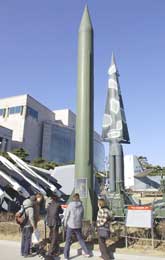 |
| A model of a Scud missile at the War Memorial Hall in Seoul. (AFP) |
Singapore, Dec. 11 (Reuters): The Scud is a crude, Soviet-designed ballistic missile with a fearsome ability to penetrate defences, despite using technology dating to World War II.
While many countries own Scuds and similar missiles, the unsophisticated weapons become controversial threats if their operators fit them with nuclear, chemical or biological warheads.
North Korea’s version of the missile has a range of about 550 km and can deliver a 770 kg warhead, according to Jane’s Strategic Weapon Systems, a standard reference work.
“Unconfirmed reports in 1997 (suggested) that a longer-range version... is being developed, with the payload reduced to 300 kg and the range increased to 800 km,” editor Duncan Lennox writes in the book.
Scuds are highly inaccurate: North Korea’s are reckoned to have only a 50 per cent chance of landing within about a kilometre of their targets. But analysts say such inaccuracy may not matter if the warhead is a weapon of mass destruction.
The Soviet Union developed the Scud in the 1950s, using rocket technology from the V-2 missile that Germany had fired against Britain in the last year of World War II. Analysts say the antique design barely makes it less of a threat, because the Scud, like any ballistic missile, falls very quickly on its target, too quickly for any normal air-defence system to shoot down.
The rocket engines of such missiles throw them up and towards their targets like balls — hence “ballistic”. The faster they are thrown, the further they travel and the faster they fall.
Since the Scud is not a long-range weapon, it travels more slowly than the intercontinental ballistic missiles that the major nuclear powers can fire across the oceans at each other.
But even its re-entry velocity is reckoned to be a great challenge for all but the most powerful US, Russian and Israeli defensive systems.
The US Patriot anti-aircraft missile won only a short-lived reputation in the Gulf War for stopping Scuds that Iraq had fired at Israel. Experts later said that the US system had largely failed to stop the Iraqi missiles.
A new Patriot-based system is supposed to be more effective.











